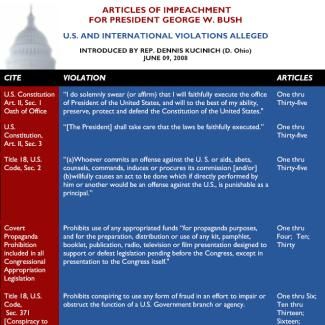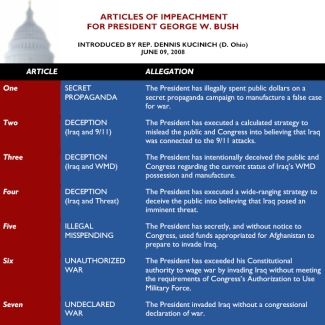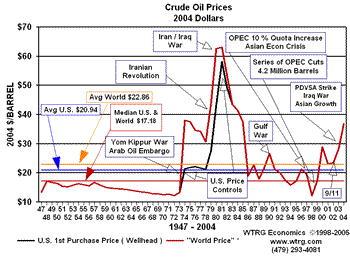 Iran, the US, and the Nuclear Non-Proliferation Treaty
Iran, the US, and the Nuclear Non-Proliferation Treaty
By Daniel Robicheau MA, Philippa Winkler PhD
The Bush Administration has repeatedly threatened to keep "all options" on the table, including the possibility of using nuclear weaponry against Iran's nuclear facilities. In addition, through the pronouncements of Prime Minister Ehud Olmert, Israel has directly threatened to use tactical nuclear weapons (mini-nukes) and conventional bombs to destroy Iran's underground nuclear facilities.
Following these threats, Olmert let slip that Israel has its own nuclear capability, a rare public admission that has slipped out before in tense situations between Israel and its neighboring countries.
Given that Israel bombed Iraq's Osirak nuclear reactor in 1982, and given that alarm bells about a nuclear Iraq, including fabrications of evidence, led to the U.S. invasion of that country, such threats would not seem to be idle. Iran practices military exercises in the Persian Gulf, while US naval battle groups assemble there.
This stand-off appears to be spiraling down to war. A nuclear attack by the US, Israel, or both, against Iranian territory would be the second time nuclear weapons will have been used in history.
Iran lies between two wars - to its west in Iraq and to its east in Afghanistan. Brinksmanship could easily turn the stand-off into real war involving a third front: Iran.
Iran's Counter-Arguments
While the media's focus is on conflict, Iran's actual arguments regarding its nuclear program are being brushed aside. However, they resonate deeply in a Middle East that has experienced constant interventions by the US and Western Europe during past colonization and wars. A new Non-Aligned Movement (NAM) of non-western countries is listening to Iran's charges of being treated by "double standards" in the current stand-off. This nod to Iran's claim is sympathetic despite the majority vote against Iran by the UN Security Council in its resolution for economic sanctions.
Several times during 2006, President Mahmoud Ahmadinejad and the former president, Muhammad Khatami, referred to Iran being treated with "double-standards" in its current nuclear stand-off with the United States and Europe. Aljazeera News on the Internet (3/4/2006) reported former President Muhammad Khatami's mention of "regional powers that possess nuclear arms," a thinly veiled reference to Israel, the only Middle Eastern state with nuclear weapons. In terms of Iran's perception that it is being treated differently from Israel by the US and key European countries, Khatami stated that Iran is the victim of "double standards": "How come these powers do not face the wrath or pressure from Europe or the US in order to make the Middle East free of such weapons?"
The US media portray the conflict in terms of an intransigent Iran unwilling to open up its nuclear program to the world. Nevertheless, 1) Iran has long been a signatory to the NPT, and 2) has allowed IAEA inspectors into its nuclear facilities for some time, whereas inspectors have not been allowed into Israeli nuclear facilities since the 1960s.
Iran's allegation of "double standards" has several aspects. One is the contrast between Iran's treatment and that of Israel, whose own nuclear program has continued unimpeded to the point that it is now a middle-tiered, nuclear-armed country. Policies toward Iraq have been very different; from 1980 to 1990, the US-led West freely transferred non-conventional technology to Saddam Hussein's regime. A second aspect involves what Iran sees as its right to pursue nuclear technology in conformity with the NPT.
Complicity in Israel's Pursuit of Nuclear Weapons
The history of Israel's nuclear program reveals intense Western involvement. Beginning in the 1950s, France clandestinely assisted Israel's construction of the Dimona nuclear facility in the Negev Desert, sending hundreds of French workers and technicians to work on the site. Since then, Israel has aggressively pursued a nuclear weapons program with the aid of western powers, especially the United States, covering up Israel's activities. From 1958 to 1960, US U2 aerial reconnaissance and British ground-based photography both monitored the construction of the Negev facility. Seeing purposes beyond nuclear energy production, Michigan scientist Henry Gomberg noted Israel's production of weapons grade plutonium at Dimona. By December, 1960, the British and US media were reporting that Israel was acquiring a nuclear weapons capability.
Israel entered an affirmative vote at the IAEA general conference in September 1960 agreeing to "safeguards," which would allow for inspections of nuclear facilities. Yet Israel's words would not be followed by deeds, in the end only allowing private inspections by the US. The first such visits were to be inadequate for determining the exact nature of the activities at Dimona, since the inspectors were not previously given photographic evidence of the U2 flights that showed the existence of a reprocessing plant - a prerequisite to the production of weapons grade plutonium.
After this first inspection by the US, seven more teams would conclude that there was no evidence of a nuclear weapons program, having consistently been denied access to aerial or ground-based photography of Dimona. Israel, now given a clean slate regarding its activities, would continue to issue public statements describing Dimona as "a textile plant," "agricultural experimental station." or a "desalinization plant." If the ruse was intended as a public relations ploy, by 1963 the US also acknowledged in CIA reports that Dimona would go "critical" within a year or two. France, through the Marcel Dassault company, was then building a delivery system for Israel known as the "Jericho" missile. From the Kennedy Administration onward, attempts to rein in Israel's development of a nuclear arsenal would prove futile.1
 Israel has sidestepped scrutiny of its nuclear program for decades. It gained nuclear cooperation without supervision, in exchange for services to major foreign powers. Certain elements of the French government, which included high-ranking military officials, supported Israel's nuclear program in exchange for information on the relationship between Egypt and the independence movement within its Algerian colony the '50s and '60s.2
Israel has sidestepped scrutiny of its nuclear program for decades. It gained nuclear cooperation without supervision, in exchange for services to major foreign powers. Certain elements of the French government, which included high-ranking military officials, supported Israel's nuclear program in exchange for information on the relationship between Egypt and the independence movement within its Algerian colony the '50s and '60s.2The US had more general objectives. Since WWII, it had sought regional influence. During the Eisenhower Administration, information about a reprocessing facility for plutonium production was kept from scientists inspecting Dimona. Meanwhile, Israel firmly rejected the placement of Atomic Energy Agency "safeguards" on its nuclear facilities, despite the push from the Johnson Administration to do so. This situation has continued because Israel is seen as important to US interests in the Middle East. Internally, US presidents have been under pressure as well from pro-Israel advocates like Abe Feldman, as well as lobbying groups, to not reveal Israel's nuclear arms program. As Yair Evron noted in his book, Israel's Nuclear Dilemma: "Indeed, the American commitment to Israel is perceived in Washington as having priority over the interest in nonproliferation."3
A Nuclear-Armed Israel: A 'Fait Accompli'
When US legislation was drafted regarding non-proliferation, Israel's nuclear arms program was treated as a fait accompli, as for example in the Glenn Amendment to the International Security Act of 1977. It stipulated that US economic and military aid be cut off to countries that imported either nuclear enrichment or reprocessing plants. Israel, of course, had imported the technology from France for both enrichment and reprocessing. However, it had done so prior to 1977 and was not affected by the legislation. Still, the Glenn Amendment included an "escape clause," as pointed out by investigative reporter Seymour Hersh, whereby the US could still provide economic and military assistance if the cut-off to the country would "be seriously prejudicial to the achievement of United States non-proliferation objectives or otherwise jeopardize the common defense and security...As long as the President and Congress define the survival and security of Israel as a US national interest , the escape clause could apply to the Israeli case."4
Since the late 1960s, Israel's nuclear arms capabilities have become widely known. Yet Israel has maintained a studied ambiguity about its nuclear arms program. Repeatedly it stated that it would not be the first country to introduce nuclear weapons into the Middle East. However, a 1968 exchange between US Deputy Secretary of the Defense Paul Warnke and Israeli Ambassador to the US Yitchak Rabin shows Israel openly confronting any challenges to its program. Rabin defended Israel's ambiguous position by arguing that current nuclear-armed powers were defined as such because they had openly tested their weapons, which Israel said it had not. Warnke countered that the physical presence of weapons, even if components were disassembled into parts, still meant that nuclear weapons had been introduced into the region. Despite the word games, Israel was defiantly maintaining nuclear weapons capability without declaring it.5 Subsequent US leaders played along with this ruse rather than acknowledge having provided economic and military aid to a nuclear armed Israel. This acknowledgment would have forced them to explain why Israel as a nuclear state could never join the NPT. The next question would have been: Why should other countries with nuclear ambitions adhere to IAEA safeguards under the NPT, but not Israel? Still maintaining its public posture of ambiguity, Israel claims that it will not be the first to introduce weapons into the Middle East. Soon after Ehud Olmert let it slip that Israel had a nuclear arms capability, he reverted to the same line as before.
The first NPT was signed by 65 countries in 1968. The last US visit to Israel's Dimona facility was the following year. Since then, there have been Non-Proliferation Treaty Review Conferences every five years. Non-Proliferation Treaty definitions are inadequate as to what constitutes a nuclear weapons state. To say that a state to be a nuclear weapon state must have exploded a device prior to the 1968 start of the NPT, is to ignore the possibility that Israel may have tested its weapons through another party (e.g. South Africa).6 Israel's status as a special case has not gone unnoticed by the rest of the world, especially when approximately 180 other non-nuclear states have acceded to the NPT.
"No Cookie Cutter Policy"
"I am often asked..., 'Well, how come you deal with that country and you don't deal with this one?' My answer is that you can't have a cookie-cutter approach to foreign policy"7- Madeleine Albright, US Secretary of State, 2000.
During the eighties the US chose to support the Ba'ath party until the 1991 Gulf War as a way of countering the potential threat of fundamentalist Islamic Iran. Known as the "Iraqi tilt," the policy began officially in 1982 when the US removed Iraq from its State terrorist list. According to a 2001 article in the Washington Post,
"U.S. intelligence and logistical support played a crucial role in shoring up Iraqi defenses against the 'human wave' attacks by suicidal Iranian troops. The administrations of Ronald Reagan and George H.W. Bush authorized the sale to Iraq of numerous items that had both military and civilian applications, including poisonous chemicals and deadly biological viruses, such as anthrax and bubonic plague." 8
As a result of the Iraqi tilt, governments worldwide were given the green light to provide Saddam Hussein with military-related dual use technology, much of which was unconventional. The US loaned agricultural credits to Iraq and provided material applying to Iraq's nuclear program, as did Britain and other countries until Iraq invaded Kuwait in 1990. In 1991, the US was ranked number one worldwide in arms sales.9 Today, the US remains silent about its contribution to the military build up of the Ba'ath Party. This policy was consistent with the goal of containing Iran - an objective promoted by neoconservatives as well as Israel.
Double Standards vs. The Right to Pursue Nuclear Technology
On the other hand, as a signatory to the Non-Profileration Treaty (NPT) as far back as 1970 ,10 Iran has consistently argued its right to pursue nuclear research for peaceful purposes - a right guaranteed it under Article IV of the NPT Treaty. In fact, Iran's first small nuclear research reactor had been bought from the US in 1959, with Shah Reza Pahlavi planning to construct 23 nuclear reactors by the 1990s . Article IV of the Treaty stipulates that a signatory has the right to either produce its own enriched uranium or purchase it on the international market, as long as the enriched uranium is used for peaceful purposes; for example, as fuel in energy production. A signal that could indicate an attempt to use enriched uranium for weapons production would occur when a country pulls out of the NPT, which only one country, North Korea, has done. Iran, on the other hand, has remained within the NPT regime, giving IAEA inspectors allowed access to Iran's nuclear facilities since February 1992.
Fair International Law
Only recently has Iran threatened and then stopped implementing the "Additional -Protocol" to the NPT, which allowed for short-notice inspections of its nuclear facilities, which it had signed in late 2003. It did so in retaliation for the IAEA Board of Governors' recommendation that Iran's case be sent to the UN Security Council. Yet, even in this case, from a purely international legal standpoint, Iran was within its rights to withdraw from the Additional Protocol, which had been signed by the previous government but never ratified by the Iranian Parliament or Majlis.
Iran would also be within its rights to withdraw from the NPT altogether, as North Korea did. Article X of the NPT stipulates that it give three months notice before pulling out of the NPT on grounds of protecting its national sovereignty. Two wars are being waged on Iran's borders, in Iraq and Afghanistan, by the Bush administration, which is threatening to bomb Iran's nuclear facilities. In such a hostile climate President Almadinejad could be seen as justified in perceiving threat to Iran's national sovereignty. Nevertheless, Iran has continued its membership.
There appears to be a glaring contradiction between "real politique" and the neutral application of international law in nuclear policy as promoted through the NPT. International law must be seen as neutral and even-handed in its relations with all nations. Instead, certain nations are allowed to sidestep legal frameworks, while others adhering to these frameworks are punished. This is the point of Iran's argument of being treated with "double-standards."
A similar lack of coherence exists with respect to the Bush administration's new acceptance of India, which also has never signed the NPT. The recent agreement between the US and India will allow civilian nuclear trade between the two countries, despite the stated policy of the NPT to discourage such activity. The deal includes safeguards and inspections of India's fourteen civilian nuclear power plants, but at the same time acquiesces to its already existing stockpile of nuclear weapons.
Here again is a contradiction between the application of international law and the political expediency of geopolitical goals. The deal will be viewed as a reward for India's participation in applying pressure on Iran. Ultimately, the same preferential treatment may be awarded to Pakistan, another non-signatory of the NPT that possesses a burgeoning nuclear weapons program.
The US policy may be leading the rest of the world onto a slippery slope of non-compliance with the NPT. Such nuclear trade deals with non-signatories of the NPT undermines the legitimacy of the NPT. A return to the spirit and intent of the Nuclear Non-Proliferation Treaty is needed, rather than bellicose statements and threats. A beginning point might be the return of nuclear arms reduction talks between the major powers, as stipulated under Article VI of the NPT.
Text taken here.





















